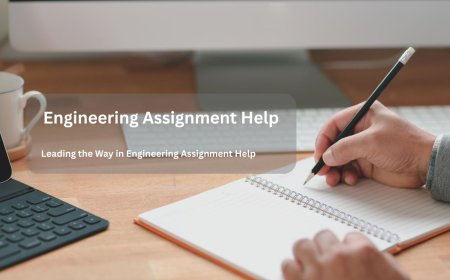Top-Rated Law Assignment Help Services in Australia
The help for assignment of law refers to professional academic services intended to help students of law in Australia with their teaching

The Australian Legal Education System is known for its depth and strictness and produces graduates who excel in different roles, from lawyers to politicians. Institutions such as the University of Sydney, the Australian National University and Bond University offer programs that combine theoretical insight with practical application and prepare students for the complexity of the legal profession. However, legal tasks - whether essays, analyses of cases or research work - present significant challenges that test the skills and resistance of students. This is a place whereLaw Assignment Helpservices in Australia and becomes a vital source and offers tailor -made tailor -made for navigation of academic requirements. This article examines the role of these services, their advantages, ethical considerations and practical guidance for students and provides a new perspective on their impact within the Australian legal environment.
Calls of Legal Tasks in Australia
Legal programs in Australia are designed to develop critical skills such as legal reasoning, legal interpretation and convincing writing. Tasks are the cornerstone of this process, but come with unique obstacles:
- Conceptual depth:Tasks often require students to engage in complex legal doctrines, such as the principles of trusting duties or concept of proportionality in constitutional law. For example, public law may includeMcCloy v New South Wales(2015) analysis.
- Research requirements:Legal research includes navigation of complex databases such as AustLII, Westlaw AU or Jade, to locate the relevant laws, cases and scientific articles. This can be depressing, especially for students who are not familiar with the methodology of legal research.
- Standards AGLC:The Australian Legal Quote Guide (AGLC4) is governed by reference to Australian legal schools and requires careful attention to details. Incorrect citations such as incorrect referencesR v Thomas(2006) can lead to significant deduction of brands.
- Time pressures:Students of law often balance exchange rate with extracurricular, such as mooting, officials in companies such as Ashurst or part -time work. This leaves a limited time to create polished tasks in close terms.
- Practical orientation:Many tasks simulate legal tasks in the real world, such as designing a contract or analysis of dispute under Australian consumer law. They require theoretical knowledge and practical insight.
These challenges underline assistance in the assignment of law that provides targeted support to help students succeed.
What is Assistance in Assigning the Right?
. These services take care of students at institutions such as the University of Queensland, Deakin University and the University of Tasmania, offering support for university, postgraduate and Yuri's medical programs. Key offers include:
- Essay writing:Crafting convincing arguments about topics such as rule of law or indigenous legal rights.
- Case studies:Analysis of orientation decisions, such asR v Lavender(2005), focusing on judicial reasoning.
- Research works:Exploring specialized areas such as intellectual property law or Australian anti -discrimination framework.
- Adjustments and proofreading:refining tasks for clarity, coherence and compliance of AGLC4.
- Tutoring services:Providing personalized instructions on complex topics such as the Wednesbury test of disproportionate or fair remedies.
These services are provided by experts with qualifications in Australian law and provide matching with local academic and legal standards.
Why Do Students Turn to Assign Law
The decision to ask for assistance in the assignment of the right is powered by unique requirements for the study of law in Australia:
High academic expectations
Law schools such as UNSW Sydney and Monash University set strict standards and require tasks that show critical analysis and originality. It helps assign law and supports students in meeting these expectations.
International needs of students
Australia attracts a diverse group of international law students, especially from Asia and Europe. These students may face challenges with language skills or ignorance with the Australian system of customary law, causing fundamental professional help.
Balance of responsibilities
Many students juggle studies with professional or personal obligations. For example, a student who has a mutual student in the Sydney law firm can try to complete the essay of the Tax Act by 2,500 words. Helps assigning the right allows better time management.
Competitive edge
Strong signs are essential for ensuring postgraduate roles, officials or postgraduate opportunities. Professional support ensures that tasks are of high quality and are in line with the designation criteria.
Custom Assisted
The tasks vary according to institution and jurisdiction. For example, the task of property rights to the University of Western Australia can focus on thetransfer of the Land Act 1893 (WA), while one on Griffith University could emphasize Queensland legislation. Help for assignment provides adapted solutions to solve these differences.
Benefits of Help to Assign Law
Cooperation with the assignment of Help Office offers a number of benefits for Australian law students:
- Expertise:Services employ experts with expertise in Australian law, such as theEconomic and Consumer Act 2010 (Cth)or cases such asR v GW(2016). This ensures accurate and relevant content.
- Savings of time:Outsourcing tasks such as research or design, students can focus on exams, lawyer competitions or network events such as seminars of legal society.
- Improved quality:Professionally created tasks are well explored, logically structured and without errors, which increases the likelihood of high brands.
- Reduced stress:The pressure of tight terms can affect mental well -being. The assignment of the right helps to alleviate this burden and promotes a healthier academic experience.
- Educational value:Revision of professional thesis helps students improve their legal writing, research skills and understanding of complex concepts, such asMabodecision or rule for evidence of parole.
Ethical Use of Help to Assign Law
While assistance in law assignment is a valuable source, students must use it responsibly to adhere to academic integrity policies at universities such as La Trobe or the University of Canberra. Here's how to ensure ethical use:
- Use as a learning tool:consider professional work as a reference to informing you about your own writing. For example, study the sampling case to understand the structure, but create your own analysis.
- Ensure the originality:Verify that tasks without plagiarism and cited properly. Renowned services provide original content with AGLC4 compatible references.
- You know institutional policies:check the instructions for the academic behavior of your university because some allow tutoring, but forbid the submission of externally written work.
- Active participation:Provide specific inputs, such as course materials or cases to ensure that the assignment reflects your understanding.
Students can take advantage of assistance in allocating the rights without risking academic sanctions.
Selection of a Reliable Help Service for Assigning a Law
For success, the selection of a trusted law is crucial. Consider these factors:
- Expertise in Australian law:The service should demonstrate expertise in the Australian legal system, including laws such as the1988 (Cth) (Cth) Personal Data Protection Act (Cth)or cases such asR v Hillier(2007).
- Qualified writers:The title for platforms with writers who have Australian legal titles or have professional experience, and ensure high quality production.
- Adaptation:The service should adapt the tasks of the requirements of your institution, whether it is a crime for RMIT or the essay of public law.
- Transparency:Choose providers with clear prices, time axes and revision principles. Avoid those who make excessive claims such as guaranteed differences.
- Student reviews:Check feedback on platforms such as TrustPilot or University Discussion Foils to assess the reputation of the service of Australian law.
- Knowledge of AGLC:Ensure that the service follows AGLC4 standards because precise links are necessary for rights.
Covered with the Assignment of Types
The assignment services support a wide range of assignment types, including:
- Legal essays:Examination of topics such as theCoe v Commonwealth(1993) impact on indigenous rights.
- Notes on cases:Analysis of decisions such asR v Swan(2003) focusing on legal justification.
- Questions about the problem:using legal principles for hypothetical scenarios, such as the right to negligence under theCivil Responsibility Act (NSW).
- Research documents:Investigation of areas such as Cyber Security Act or Australian international trade obligations.
- Legal memorandum:elaboration of expert advice for simulated clients, often used in clinical legal education.
- Theses:Support for postgraduate students with projects on topics such as environmental law or constitutional reform.
Each type is approached to accuracy, which ensures alignment with Australian legal standards.
The Impact of Technology on Assistance in the Allocation of Law
This technology has changed assistance in allocation and increased its efficiency and availability:
- Research controlled AI:The tools make the process of locating the relevant cases and laws, saving time to students and writers.
- Plagiarism detection:Software like Turnitin ensures that tasks are original and protect academic integrity.
- Online tutoring:Platforms like Zoom allow real -time support and help students to clarify concepts such as Dixon Test in Contract Law.
- Citation tools:Software configured for AGLC4, such as Mendeley, provides accurate links.
These innovations allow you to assign access to the law to students in distant areas such as Darwin or Broome.
Cost and Availability
The cost of the law varies depending on the complexity of the assignment, length and urgency:
- Essay 1,000 words can cost 50-100 AUD.
- Research work or urgent task could range from AUD 150-300.
- Discounts are often available for first users or bulk orders.
Online platforms ensure availability for students throughout Australia, from urban centers, such as Brisbane to rural communities in South Australia.
Support of Various Legal Fields
Help the Assignment of the Services Act to ensure a wide range of legal disciplines, including:
- Constitutional Law:Analysis of cases such asPlaintiff M70/2011 v Minister for Immigration(2011).
- Criminal Law:Examination of Defense under the1995 Criminal Code (Cth) Act.
- Crime of Crime:Conversion of Questions such as defamation or negligence under the State Laws on Civil Responsibility.
- International Law:Examination of Australia obligations under contracts such as the Paris Agreement.
- Native Law:Examination of Land Rights under the1993 Native Title Act (Cth).
- Company Act:Analysis of public issues under the2001 Corporations Act (Cth).
This versatility ensures support of students in all areas of legal studies.
Helps the Future of the Assignment Act
Help for assignment of landscape law develops with trends like:
- Practical skills development:increased support for tasks imitating legal practice, such as preparation.
- Integration of legal technologies:Using AI tools to analyze cases or predictive legal results.
- Ethical Focus:Support for responsible use as helping learning.
- Global Expansion:Support for foreign students studying Australian law or comparative law.
This development ensures assistance in the assignment of the right remains a basic source for future law students.
Practical Tips for Efficient Use
If you want to maximize assistance in assigning the right, students should:
- Provide detailed panties:Instructions for assignment of shares, lecture notes and sections.
- Communicate deadlines:Enter the timeline to ensure timely delivery.
- Review proposals:Provide feedback to align your voice.
- Learn from the output:Use professional tasks to improve legal analysis and writing.
- Accessory Study:Combine professional assistance with independent learning.
Conclusion
Assistance in allocation of law in Australia is a transformative source for students who navigate the call of legal education. By providing professional management, savings of solutions and adapted support, these services allow students to excel in the management of competitive requirements. Ethical use of Law Assignment Help Australia is essential, while students consider professional assistance to be a learning tool rather than an abbreviation. By selectingAssignment Helprenowned providers and actively involvement of students of Australian rights, they can use the right to help control their course, deepen their legal knowledge and lay the basis for a successful career in the legal profession.
FAQs
How do I choose a reliable provider?
Look for service providers that:
- Employ Australian-trained legal writers or tutors
- Provide plagiarism-free content
- Maintain strict confidentiality
- Offer customised, original assistance
- Clearly communicate turnaround times and pricing
Reputable platforms also have positive reviews and transparent academic support policies.
Will the assistance improve my legal writing and research skills?
Yes, when used as a learning tool. Reviewing model answers, receiving annotated feedback, or learning how to structure legal arguments can help students develop better research and writing habits. Over time, this contributes to independent academic improvement.
Is help available for last-minute or urgent law assignments?
Most services offer various delivery options, including express support for assignments with short deadlines. However, quality is generally better when students plan ahead, allowing more time for comprehensive research and feedback.
Is Law Assignment Help suitable for both undergraduate and postgraduate students?
Yes, services cater to both levels. Undergraduate students might require help with basic legal principles and writing skills, while postgraduate students often seek advanced guidance on legal theory, research dissertations, or specialisation topics such as environmental law or human rights law.



























